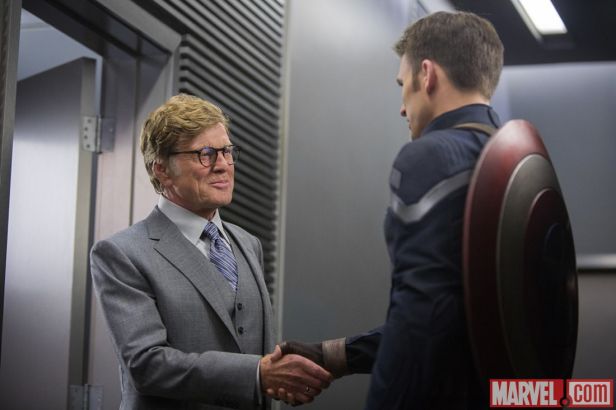“You know how I know Captain America is going to be awesome?” my libertarian friend teased. “How?” I asked. He said, “Because I saw the Free Beacon and some hawk at National Review didn’t like it much.”
Videos by Rare
I found the Free Beacon review by Sonny Bunch, who called Captain America a “paranoid” 70s-style thriller. Giving the film an above average review, Bunch zeroes in on the film’s politics:
This is the closest Marvel studios has come to making a statement film: The characters (and their surrogates in the audience) are asked to grapple with the ability of drone-like weapons to deliver extrajudicial death, the tradeoffs between security and liberty, and whether attaining a world of order and safety is worth taking out a couple (million) troublemakers.
Bunch finishes, “Try to guess which side of the debate the filmmakers support.” (Hint: It’s not the same side the neoconservative Free Beacon supports).
The National Review “hawk” was film critic Armond White, who panned it as “Red, White and False,” basically saying it didn’t show enough respect for the military and authority figures.
Perhaps the most scathing conservative critique came from the Twitter account of Washington Examiner columnist Philip Klein. The hawkish, but usually measured and reasonable, Klein Tweeted:
Don't see "Captain America 2" unless you're in the mood for pro-Snowden propaganda.
— Philip Klein (@philipaklein) April 5, 2014
He followed with:
Didn't realize Glenn Greenwald & Alex Jones co-wrote movies until I saw "Captain America 2."
— Philip Klein (@philipaklein) April 5, 2014
And he’s right. Well, at least about the Greenwald and Snowden parts.
Captain America is a movie that Edward Snowden and Glenn Greenwald would probably love. It is a film that asks the viewer to be suspicious of the national security state and jealous of their constitutional liberties. It leads one to wonder whether Obama’s kill list might be morally hazardous. It questions whether some of the things governments do in the name of “keeping us safe” are ethical, or even actually designed to keep us safe.
It makes drones seem like big, bad scary things.
Captain America makes you wonder if in balancing security and liberty, shouldn’t we always err on the side of liberty?
This same question divides conservatives today.
Senator Rand Paul’s 2013 filibuster over U.S. drone policy and due process rights excited most conservatives. The same was true of his efforts to reign in the National Security Agency’s controversial metadata collections program last year.
In opposing giving President Obama the ability to assassinate American citizens or the NSA the broad power to collect all of our phone information, there was something close to a consensus amongst most conservatives.
But there was also still a significant divide.
New Jersey Governor Chris Christie called Paul’s filibuster a “strain of libertarianism” that was “dangerous.” Defending Obama’s drone policies, Christie warned Paul “The next attack that comes that kills thousands of Americans as a result, people are going to be looking back on the people having this intellectual debate.”
Rep. Peter King of New York was harsher, “tell Rand Paul to stop doing overnight filibusters on people being killed with drones in Starbucks. We should be standing by our military. Standing by the intelligence agencies.”
King would add, “For Senator Paul to compare that patriot, General Clapper, with someone like Snowden, who is a traitor, who has put American lives at risk — Senator Paul should be ashamed of himself.” King said Paul, “disgraced his office and he owes General Clapper an apology immediately.”
Director of Intelligence James Clapper had lied to Congress about the breadth of the NSA’s data collection activities.
Just this month, former Vice President Dick Cheney attacked NSA critics, saying “(The idea) that we have created in the National Security Agency this monster bureaucracy that’s reading everybody’s mail, listening to everybody’s phone calls, infringing upon our civil liberties and civil rights. Hogwash.”
Just a few days after Cheney’s statement, we learned the NSA was doing exactly what Cheney said it wasn’t.
No matter, Cheney will continue to defend everything the agency does without hesitation. Peter King will continue to find zero fault with the NSA, despite widespread public backlash over its metadata collection program. Christie is tired of “intellectual debates” over civil liberties, putting his full faith and trust in our government.
 Like Captain America, Paul and other conservatives now seek to err on the side of liberty in these real-life debates. But for every Paul, Rep. Justin Amash, or even national security state critics like James Sensenbrenner or Glenn Beck, there is a Christie, a King, a Cheney and a Free Beacon—hawkish, neoconservative-leaning Republicans, who truly value security over liberty at every turn.
Like Captain America, Paul and other conservatives now seek to err on the side of liberty in these real-life debates. But for every Paul, Rep. Justin Amash, or even national security state critics like James Sensenbrenner or Glenn Beck, there is a Christie, a King, a Cheney and a Free Beacon—hawkish, neoconservative-leaning Republicans, who truly value security over liberty at every turn.
They would never frame it this way, of course, but with every new discovery of executive overreach or fresh news about possible unconstitutional activities carried out by this administration, these Republicans almost always defend the national security state and blast its conservative critics.
Essentially, they trust government—its judgment, superior wisdom, omnipotence and benevolence. Needless to say, this is a strange predilection for anyone calling him or herself a conservative.
There is much grey area and diversity of opinion on both the liberty and security sides of this balance. There are also unquestionably times when more security is needed, particularly in the wake of national tragedy or when faced with legitimate threats.
But the lines that should never be crossed regarding privacy and basic legal protections are clearly outlined in the Constitution. Paul’s 2013 filibuster and the ongoing debate over NSA spying on citizens are both related to the Fourth Amendment.
Today, most conservatives who always err on the side of security seem to have no qualms in stepping over, or even completely eradicating, those important constitutional boundaries.
Those restrictions on the state were instituted by our Founders so that there would always be a basic protections of individual liberties, even in times of war or national emergency.
Some Republicans, eternally on a war footing, could care less.
As Captain America’s superiors explain to him the need for new and startling pre-emptive security measures, including the use of massive drones hovering above the citizenry, the superhero observes, “This isn’t freedom, this is fear.”
Was he right? Or just having yet another paranoid, intellectual debate?
Disclosure: I co-authored Senator Rand Paul’s 2011 book The Tea Party Goes to Washington



